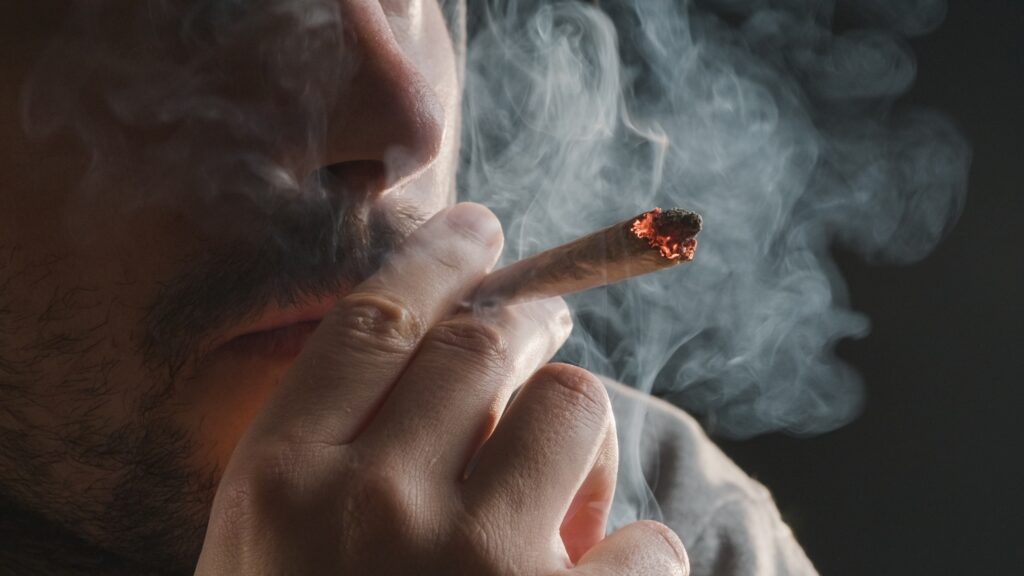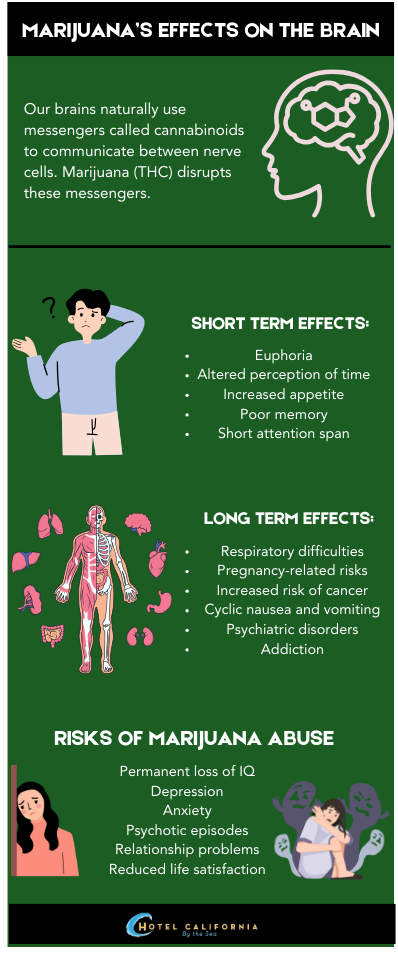Is Marijuana a Stimulant?
Marijuana. Weed. Cannabis. The substance goes by many different names. It is a popular mind-altering substance that is most commonly used recreationally and illegally among people of all age groups. Today the perception of weed among many people is that the drug is not as harmful or dangerous in comparison to other mind-altering substances. This sentiment is especially shared among the younger generation. So what type of drug is marijuana? In many cases, marijuana is put into its own classification of cannabis.

The reasoning behind its own classification is that marijuana can produce many different effects which can put it into classifications as a central nervous system depressant, stimulant and psychoactive hallucinogen. Each user will respond to marijuana differently. For some people, it can make them feel calm and at ease, while in others, it can make them feel anxious and on high alert. Ultimately, marijuana can produce a variety of physiological and physical effects that will depend on the individual user.
What is Marijuana?
Marijuana is a substance extracted from the cannabis plant. Most strains of marijuana contain the psychoactive ingredient called delta-9-tetrahydrocannabinol (THC). This substance can alter a person’s mental state and when abused, is often linked to conditions of depression, anxiety, suicidal ideation and psychotic episodes. Marijuana can be ingested orally by mouth or inhaled by smoking. It is a popular drug among the younger generation and if abused early on, it can cause permanent IQ loss, damage to brain development and long-term health issues.
Marijuana is a drug that produces varying effects mimicking different types of drugs. Despite having its own category and classification, many view marijuana as a depressant drug. One of the most common side effects of the drug includes the slowdown of messages traveling from the brain to the body. It causes the nerves to calm down, the body to relax and even lower cognitive inhibitions in its user.
What are the different Drug Classifications?
- Depressants – Central nervous system depressants work by slowing down your brain functions and producing feelings of calm, relaxation and sedation. Commonly known depressant drugs include alcohol, Xanax, and benzos.
- Stimulants – Stimulant drugs work by elevating a person’s mood, increasing alertness and sometimes increasing energy. It is one of the most highly addictive substances and with long-term use, can cause paranoia and other psychoactive side effects. Common stimulants include cocaine, methamphetamine and other prescription amphetamines.
- Hallucinogens – Psychedelic drugs work by altering the perception of reality and changing the way the nerve cells in the brain communicate with each other. Examples of hallucinogens include MDMA, ketamine and LSD.
- Opiates – Opioid drugs are powerful painkillers that produce intense feelings of euphoria and pain relief. It is highly addictive and can have lasting effects on the brain. These types of drugs include heroin, morphine and other prescription painkillers.

Is Marijuana a Stimulant? What drug category does it fall under?
Marijuana is a stimulant. Marijuana can also be a depressant. Marijuana can also produce symptoms of a hallucinogenic. In fact, marijuana produces symptoms of multiple categories of drugs.
Marijuana as a Stimulant
Research and reports have found that the stimulating effects of weed most often occur when smaller doses of the drug are taken. Users have reported experiencing increased energy, bursts of creativity, motivation and increased productivity. Other stimulating side effects of marijuana use include feelings of elation, having trouble being still and symptoms of hyperactivity. On the opposite spectrum, marijuana use can also produce negative effects such as increased heart rate and blood pressure in the body. Like other stimulants, the negative strain it can have on the user also includes increased body temperature, paranoia, irregular heartbeat and anxiety.
The stimulant effects of using marijuana are not a very common occurrence. Most people who use the drug don’t often report these types of energy-enhancing effects.
Marijuana as a Depressant
Depressant effects are the most common effects reported by marijuana users. It usually occurs in larger doses of marijuana consumption. Depressant drugs are actually less addictive compared to other types of drugs. However, there is still a risk of developing tolerance and dependence on depressants. Some common depressant effects when using marijuana include sedation, relaxation, reduced motor control, slowed breathing, lowered blood pressure, slurred speech and blurred vision. Some of the negative effects include nausea, confusion and short-term memory loss.
When it comes to heavy or chronic users, the depressant effects can have more of an impact on the user. Heavy use can also lead to loss of motivation or drive, feeling drained or fatigued, brain fog, inability to focus, depression, feeling sluggish and feeling numb or disinterested. Most of the sedative and depressant effects of marijuana are temporary and will go away within days or weeks after stopping the use of the drug. The sedative effects of weed are strongest and most effective 1-3 hours after smoking or inhaling the drug.
Marijuana as a Hallucinogen
Hallucinogenic and psychedelic effects can occur in marijuana users. However, it is not a very common occurrence and most users do not report experiencing hallucinogenic effects from consuming marijuana. According to the National Institute on Drug Abuse, very large doses of marijuana have the potential to cause hallucinations, delusions and loss of personal identity. Fortunately, they are also just temporary effects that go away when the drug has worn off and drug use has stopped.
The hallucinogenic effects that can occur from marijuana use include an altered sense of time and space, loss of motor control, detachment from self and environment, feeling disoriented, feeling confused, increased sensory sensitivity and visual and auditory hallucinations. Over time, with continued heavy use, the hallucinogenic effects of the drug can also cause the development or worsening of mental health conditions such as anxiety and depression.
Check Your Insurance Coverage for FREE
Find out if your insurance covers addiction treatment in minutes. We accept most insurance!
Factors that impact the effects of Marijuana
There are many factors that impact what type of experience marijuana can produce in a user. For example, sometimes the effects can be caused by the dosage. Low doses or micro-doses of marijuana can produce stimulating effects on the user. Higher doses are most often associated with sedative and depressing effects. Extreme doses of marijuana can cause a user to hallucinate and have a psychedelic experience.
The route of administration of the drug impacts the effects of marijuana. Smoking, vaping and consuming weed orally all impact a user differently. In some cases, it can produce intense sedative effects and for others it does not.
The strain of marijuana can also impact the effects. Some strains such as, Indica-dominate is believed to produce strong depressant effects compared to other strains of the drug.
Factors related directly to individual users include age, genetics, history of marijuana use, tolerance level, past experiences being high and expectations of being high.
Reach out to Hotel California by the Sea
We specialize in treating addiction and other co-occurring disorders, such as PTSD. Our Admissions specialists are available to walk you through the best options for treating your addiction.
Treatment for Substance Use Disorder
Marijuana is a popular recreationally used substance across the globe. It can produce stimulant effects, depressant effects and hallucinogenic effects. Because of its ability to adapt and produce varying effects that mimic other drug types, it is often labeled into its own category of drugs. Because of its widespread popularity, it is also a very common addiction among substance abusers. Professional treatment programs such as Hotel California by the Sea specialize in treating substance use disorders including addiction to marijuana.
We provide treatment at all levels of care including detox, residential, PHP and IOP. We utilize evidence-based treatment methods such as CBT, DBT, group therapy and family therapy. Hotel California by the Sea is dedicated to helping our clients overcome their addictions and reach their goals of sobriety and recovery.
References:
https://www.healthline.com/health/is-weed-a-depressant
https://www.choosingtherapy.com/is-weed-a-depressant/
https://leafwell.com/blog/is-marijuana-a-depressant
https://www.addictiongroup.org/blog/is-weed-depressant/
